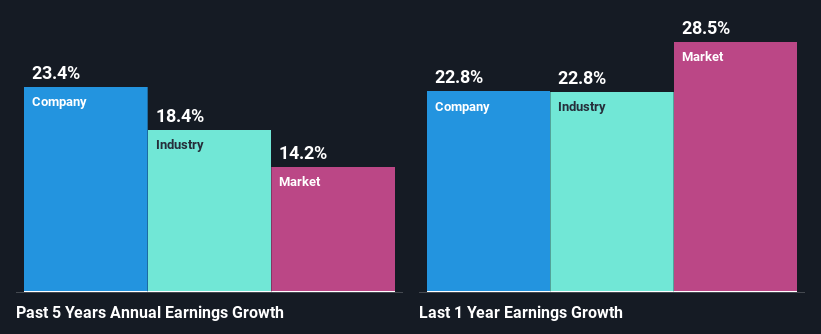Is Weakness In Universal Store Holdings Limited (ASX:UNI) Stock A Sign That The Market Could be Wrong Given Its Strong Financial Prospects?
It is hard to get excited after looking at Universal Store Holdings' (ASX:UNI) recent performance, when its stock has declined 27% over the past three months. However, a closer look at its sound financials might cause you to think again. Given that fundamentals usually drive long-term market outcomes, the company is worth looking at. Specifically, we decided to study Universal Store Holdings' ROE in this article.
ROE or return on equity is a useful tool to assess how effectively a company can generate returns on the investment it received from its shareholders. In other words, it is a profitability ratio which measures the rate of return on the capital provided by the company's shareholders.
See our latest analysis for Universal Store Holdings
How Is ROE Calculated?
Return on equity can be calculated by using the formula:
Return on Equity = Net Profit (from continuing operations) ÷ Shareholders' Equity
So, based on the above formula, the ROE for Universal Store Holdings is:
20% = AU$22m ÷ AU$111m (Based on the trailing twelve months to December 2021).
The 'return' is the income the business earned over the last year. That means that for every A$1 worth of shareholders' equity, the company generated A$0.20 in profit.
What Has ROE Got To Do With Earnings Growth?
Thus far, we have learned that ROE measures how efficiently a company is generating its profits. We now need to evaluate how much profit the company reinvests or "retains" for future growth which then gives us an idea about the growth potential of the company. Assuming everything else remains unchanged, the higher the ROE and profit retention, the higher the growth rate of a company compared to companies that don't necessarily bear these characteristics.
Universal Store Holdings' Earnings Growth And 20% ROE
At first glance, Universal Store Holdings seems to have a decent ROE. And on comparing with the industry, we found that the the average industry ROE is similar at 21%. This certainly adds some context to Universal Store Holdings' exceptional 23% net income growth seen over the past five years. However, there could also be other drivers behind this growth. For instance, the company has a low payout ratio or is being managed efficiently.
We then compared Universal Store Holdings' net income growth with the industry and we're pleased to see that the company's growth figure is higher when compared with the industry which has a growth rate of 18% in the same period.
Earnings growth is an important metric to consider when valuing a stock. It’s important for an investor to know whether the market has priced in the company's expected earnings growth (or decline). Doing so will help them establish if the stock's future looks promising or ominous. One good indicator of expected earnings growth is the P/E ratio which determines the price the market is willing to pay for a stock based on its earnings prospects. So, you may want to check if Universal Store Holdings is trading on a high P/E or a low P/E, relative to its industry.
Is Universal Store Holdings Efficiently Re-investing Its Profits?
The three-year median payout ratio for Universal Store Holdings is 34%, which is moderately low. The company is retaining the remaining 66%. By the looks of it, the dividend is well covered and Universal Store Holdings is reinvesting its profits efficiently as evidenced by its exceptional growth which we discussed above.
Along with seeing a growth in earnings, Universal Store Holdings only recently started paying dividends. Its quite possible that the company was looking to impress its shareholders. Looking at the current analyst consensus data, we can see that the company's future payout ratio is expected to rise to 64% over the next three years. Regardless, the future ROE for Universal Store Holdings is speculated to rise to 28% despite the anticipated increase in the payout ratio. There could probably be other factors that could be driving the future growth in the ROE.
Summary
Overall, we are quite pleased with Universal Store Holdings' performance. In particular, it's great to see that the company is investing heavily into its business and along with a high rate of return, that has resulted in a sizeable growth in its earnings. On studying current analyst estimates, we found that analysts expect the company to continue its recent growth streak. To know more about the company's future earnings growth forecasts take a look at this free report on analyst forecasts for the company to find out more.
Have feedback on this article? Concerned about the content? Get in touch with us directly. Alternatively, email editorial-team (at) simplywallst.com.
This article by Simply Wall St is general in nature. We provide commentary based on historical data and analyst forecasts only using an unbiased methodology and our articles are not intended to be financial advice. It does not constitute a recommendation to buy or sell any stock, and does not take account of your objectives, or your financial situation. We aim to bring you long-term focused analysis driven by fundamental data. Note that our analysis may not factor in the latest price-sensitive company announcements or qualitative material. Simply Wall St has no position in any stocks mentioned.

 Yahoo Finance
Yahoo Finance 
